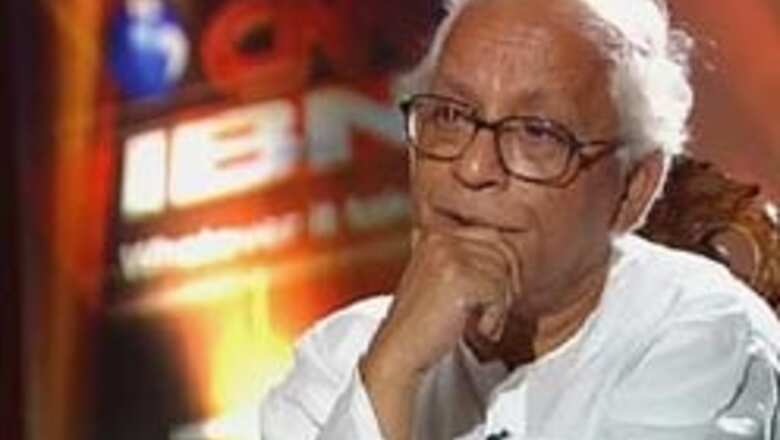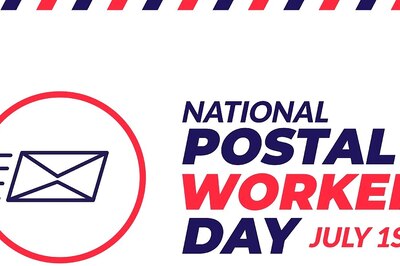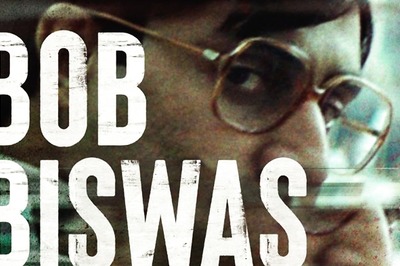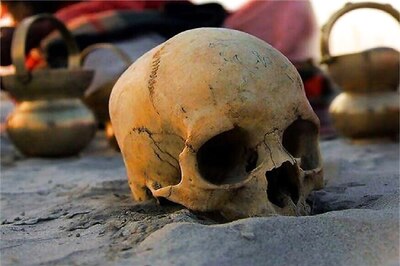
views
Sagarika Ghose: Hello and welcome to this special programme - The New Buddha - a CNN-IBN exclusive. With us is the man of the match of the 2006 West Bengal Assembly elections, Chief Minister Buddhadeb Bhattacharya.
Mr Bhattacharya, thanks very much for joining us. A gigantic victory for you, a massive mandate, a three-fourth majority and for the seventh consecutive time. Is this a victory for the Left front, a victory for Buddhadeb Bhattacharya or a victory for 'brand buddha'?
Buddhadeb Bhattacharya: It is a victory of the Left front and also the victory of the people. Individuals matter little, you know. We try to perform collectively and Left front is not a hotchpotch electoral front and it has emerged from a long struggle during the Congress regime.
And after that when we came to the government, the Left front has expanded in rural areas and in urban areas. Millions of people are participating in this campaign; it's a mission. I am all of them.
Sagarika Ghose: But over the past five years, hasn't your personality dominated a party which is known for its collective leadership, haven't you acquired a larger than life persona?
Buddhadeb Bhattacharya: I don't know. The media people can describe me in such manner, but I feel I'm one of them. I am trying to perform in my own way.
Sagarika Ghose: Is your style of politics different from other Left leaders? You appear on the same platform as Ratan Tata, Harsh Neotia. Are you someone who is trying to break free of the traditional Marxist ideology, the shackles of traditional ideology?
Buddhadeb Bhattacharya: I am very clear in my mind what I am trying to do in West Bengal. We need industrialisation, we need investment. Therefore, I have to perform and I have to work hard to attract - like you mentioned - Ratan Tata. It's good that he's finalised to invest in West Bengal for his small car, it's an important project for Bengal. Also, I'm trying my best to attract foreign investment.
The Japanese have responded. This is my responsibility because millions of young people want jobs. Some among the young generation are half-educated, some are highly-educated and they want jobs. The main thing is how to create job opportunities for the young people in the manufacturing sector, small scale, medium sector and also in the knowledge based industry - IT and biotechnology.
Therefore, I have to attract foreign investment, I have to attract domestic investment and of course I have to depend on the corporate houses.
Sagarika Ghose: Do you think the Marxist's have made a lot of mistakes in the past in West Bengal.
Buddhadeb Bhattacharya: Yes, we have learnt from our mistakes. We did commit some mistakes in the early 60s and the early 70s in the name of the trade unions and I am trying my best to erase that image of West Bengal.
I am trying to portray West Bengal as an investment-friendly government and also I am trying my best to persuade the trade union leaders to behave. They must understand the competitive world. The production and the quality of production are not only the head ache of the management, the trade unions should also share this, otherwise the industry will collapse.
They will lose their jobs. Therefore, I want a harmonious relation between the management and the labour. In the 60s, when we were in the opposition, we encouraged some irresponsible agitation in different industries that does not help us. We have the change that image of West Bengal and prove that we are not only investment friendly in our speeches, but also in our actions.
Sagarika Ghose: So, you are a communist who is practicing capitalism at this stage?
Buddhadeb Bhattacharya: What is the alternative? I am very conscious of what I am doing. We are a small state in a big country. We are only one among 28 states, how can I build socialism in one part of a country? That is not possible. Therefore, if I we have to develop, we need capital and that is private capital.
Sagarika Ghose: You are making a conscious attempt to reach out to the lower sections, to the urban rich, to the middle class and to the rural rich also. Aren't you afraid that in this new thrust of the Left Front, you will lose your traditional constituency of the rural poor?
Buddhadeb Bhattacharya: No, our priority was always in the rural sector. Even now, my basic responsibilty is to improve the basic quality of life of the people living in the villages, who live below the poverty line. The number has gone down. When we formed this government in 1977, 56 per cent were below the poverty line. Now, the number has come down to nearly 20 to 22 per cent. My basic objective is - How to improve the quality of life of these people. This is when 65 per cent of the people live in the rural areas.
PAGE_BREAK
Sagarika Ghose: Are you satisfied that the benefits of your industrialisation have been equitably distributed? Because at the same time that you are encouraging IT and the new service industry, we also find that traditional industries like jute, chemicals and engineering are declining and leading to joblessness.
Buddhadeb Bhattacharya: I am trying to take a balanced view. First, we have to protect the traditional industries. Tea is all right now. There is a domestic market and it is also being exported. There is some problem in the jute industry.
We have to diversify the jute production and only jute bags will not help. And for that we have held many discussions and workshops. Engineering industry is also coming back. Our first motive is to protect the traditional industries. Second, we have to try to re-open some important closed factories. We have done that in the case of Jessop, Dunlop and a couple of Central government undertakings.
At the same time, we cannot ignore knowledge-based industries like IT and biotechnology. But these areas are for the best students, but the common boys and girls want jobs. Therefore, we have to have to create jobs in areas as horticulture, food processing, sericulture, leather, machine tools, and plastics. Also the service sector like hotels and tourism.
It is these small industries that create job opportunities. I am not only emphasising on IT and biotechnology that will not help us, we have to take a balanced view.
Sagarika Ghose: It is a kind of a brute majority that you are enjoying in the Assembly. Is it good for the democracy to have an opposition-free Assembly?
Buddhadeb Bhattacharya: I don't think it is a brute majority. Whenever it is a big majority, it is called a brute majority. But I cannot help the opposition to increase their numbers. How can I help them? It is because of their poor performance. But you have said correctly - theoretically in a Parliamentary democracy, if in a there is a responsible opposition party and it correctly decides the government, its policies through the Assembly in a constructive manner, it helps, no doubt.
But what I feel now is that in the next Assembly, the opposition's performance will be very poor and they will also take us down, that will be its another problem.
Sagarika Ghose: The opposition will take you down?
Buddhadeb Bhattacharya: Yes, because most of the good speakers, they got defeated.
Sagarika Ghose: The other salient feature of this campaign has been the that the Election Campaign and the writer's building had been loggerheads. Was it right for the CPM to target the Election Commission in this way?
Buddhadeb Bhattacharya: I have not made any statement against the Election Commission. Till now, I have not done so.
Sagarika Ghose: But there have been a number of leaders like Biman Bose who have come out in the open and criticised the Election Commission.
Buddhadeb Bhattacharya: What we have discussed in the party is that the role of the Election Commission should be discussed at the national level.
Sagarika Ghose: Don't you think that they have delivered a free and fair verdict, which has been to your advantage?
Buddhadeb Bhattacharya: Yes. What they are saying is that all the earlier elections were bogus and it was scientifically rigged. These results prove otherwise. We have the majority's support and the Election Commission also understood 'what is what'.
Sagarika Ghose: You have embarked on the process of industrialisation and the process of inviting investment into West Bengal, does this put you in collision course with the Left in Delhi? Is the politburo in Delhi going to hold you back, given the role that the Left is playing in Delhi and the very different role that you are seeing into playing in Kolkata?
PAGE_BREAK
Buddhadeb Bhattacharya: I am just coming back from the Politburo meeting in Delhi. Sometimes, a section of the media try to find some differences between Delhi and Kolkata, things are not like that. We have a policy making process and it is correct that we debate within ourselves in the party at different forums - at the Politburo, central committee and even in the party conference.
Since it is a living party, we have to debate and through these debates, we come to certain conclusions, certain consensus. For example, about FDI, we do not have any differences in Delhi and Kolkata, we allow FDI.
Sagarika Ghose: How far will you go? Will you allow FDI in retail?
Buddhadeb Bhattacharya: Not in retail, I am against that.
Sagarika Ghose: What about privatisation of the airports?
Buddhadeb Bhattacharya: No, I am coming to that. About FDI, it generally will come for an investment, for new technology, to create job opportunities. We are against the FDI in retail. Prime Minister personally told me that why don't you meet WalMart. I met him and asked him, "What is your business plan?" From what they told me, I am not ready to invite them to my state right now. It will collapse our agriculture. Anyway, at this time, I am not willing to invite them to our state.
Sagarika Ghose: You will not allow...
Buddhadeb Bhattacharya: No, not at this moment. We need modern market mechanism for agricultural products, particularly vegetables and fruits. But you see between these consumers and farmers, thousands of people are engaged in these activities, they will lose their jobs. I just cannot take this responsibility at this moment.
At the same time, when it is a modern market mechanism, we have to gradually change our position. Another point is privatisation. We are opposing privatisation in Navratnas because these are powerful public undertakings, not only profit-making, they are the backbone of our national economy. In our state, we are restructuring 56 public undertakings.
All of them are loss making and all of them were in private hands. We took over, and now, we are facing the music. We are trying to restructure them. About Special Economic Zones, we had our differences within the party, we debated and we discussed and now, it is all right. Some print media also writes that Delhi is following one line and the state government is following the other. That is not correct.
Sagarika Ghose: Do you think that there will now be a Buddho-led rethink within the Left itself, given this huge mandate that you have got?
Buddhadeb Bhattacharya: My colleagues are also changing, the world is changing, we are not fools, we are realists. I prefer the word 'realists' not 'pragmatists'. Pragmatism is something that smacks of opportunism.
Sagarika Ghose: A number of people have said that you are a practical communist, that you are the Deng Xio Peng of West Bengal...
Buddhadeb Bhattacharya: Deng Xio Peng was a great visionary, I am not like that. But we have to understand the reality and we have to understand the objective condition of the country and we have to apply Marxism accordingly. We just cannot stick to our dogmas, that is the point. We must reform.
Sagarika Ghose: What about the balance between the party and the government, a number of people have said that you are heightening the role of the government and the role of the party is being negated. All those district level secretaries who are working night and day - the 365-working day cadre - that you are down-playing them and emphasising more on the government and the high-profile ministers.
Buddhadeb Bhattacharya: No, it is not correct so far our party is concerned. We are participating in a Parliamentary democracy, which is a party based democracy, therefore the party has an important role to play in formulating government policies and programmes. But party is more important to us.
Sagarika Ghose: Party is more important to you than the government?
PAGE_BREAK
Buddhadeb Bhattacharya: Of course, when I joined the party, I never thought that I am going to be the Chief Minister of West Bengal and I am going to be the minister of a state. We joined the party for a definite reason, an ideological reason, a political reason.
We have a mission. That is the main thing and therefore we have to build up the party, we have to rectify the party and we have to orient the party and renew the ideas of the party. That is most important for us.
Sagarika Ghose: And what Buddhadeb Bhattacharya's mission?
Buddhadeb Bhattacharya: Mission? To advance our economy and to improve the quality of life of the people.
Sagarika Ghose: Not to build socialism?
Buddhadeb Bhattacharya: At this moment no, it is not possible.
Sagarika Ghose: Jyoti Basu has said that you must play a larger role at the centre. He said that it was a historic blunder that he did not play a larger role at the centre. Are you going to do that?
Buddhadeb Bhattacharya: I saw what he said on the television . I told him frankly that I am a poor Chief Minister of West Bengal, I only want to work in West Bengal and I will not be able to perform on the national plain.
Sagarika Ghose: Why do you feel that? Why don't you feel confident enough to work on the national level?
Buddhadeb Bhattacharya: I don't have the maturity or the experience like Jyoti Babu.
Sagarika Ghose: You want to be restricted just to a regional area, just to West Bengal?
Buddhadeb Bhattacharya: Yes, that is a very important task.
Sagarika Ghose: Don't you think that this kind of a 'rethink' that you have to offer can actually take the Left to a national relevance?
Buddhadeb Bhattacharya: That I participate in the party when we discuss national issues. Just now, we are discussing many other issues in the party. That Is can participate, but I cannot move around the every part of the country as a national leader. I know my limitations.
Sagarika Ghose: So you want to be a Deng Xia Peng of West Bengal, but not the Deng Xia Peng of India?
Buddhadeb Bhattacharya: No Deng Xio Peng, but a loyal party worker and a responsible Chief Minister. I have to perform.
Sagarika Ghose: Why did you leave the party and the government in the 90s?
Buddhadeb Bhattacharya: I had certain differences.
Sagarika Ghose: What differences?
Buddhadeb Bhattacharya: I just cannot tell you.
Sagarika Ghose: With who?
Buddhadeb Bhattacharya: With the party.
Sagarika Ghose: What were the differences - Ideological or personal?
Buddhadeb Bhattacharya: It was not ideological, it was personal.
Sagarika Ghose: Personal? You don't want to tell us what they were?
Buddhadeb Bhattacharya: But finally, what I thought was that the party is above the person. Therefore, I took responsibility when I was called again.
PAGE_BREAK
Sagarika Ghose: So, it was a personal difference with one person, is that is the hint that you are giving us?
Buddhadeb Bhattacharya: No.
Sagarika Ghose: You are a playwright, do you still have the time to write?
Buddhadeb Bhattacharya: No, at this time, I am not writing anything. I am just reading books. When I go back to my house - no matter what time it is - I just cannot avoid reading something. But for writing, you must have some concentration that is not possible now.
Sagarika Ghose: When you wrote the plays Hard Times and Poka, what were you trying to express? What sort of emotions were you trying to express?
Buddhadeb Bhattacharya: Hard Time was just a reaction on the demolition of Babri Masjid. I wrote it and it was translated in Hindi also. It was staged in Lucknow and Kanpur also. It was an immediate reaction to Babri Masjid.
But Poka is the story of Franz Kafka, the metamorphosis is haunting me from my college days. I took the challenge to translate it into a drama and adaptation in Bengali. And I have done it. It was performed many times.
Sagarika Ghose: Everybody says you have a very close relationship with your wife and daughter. Are they responsible, to a large extent, for your sensitivity, for your creative energies?
Buddhadeb Bhattacharya: Of course. Yes. My daughter and my wife inspire me to perform.
Sagarika Ghose: Do you encourage her to be an activist? I know she was protesting against the Dhananjay Chatterjee incident?
Buddhadeb Bhattacharya: I don’t interfere in what they think. My daughter’s graduated in Political Science, and then she said, 'look father, I have no interest in politics'. Now she’s studying wildlife management. From Political Science to wildlife management.
Sagarika Ghose: Well, wildlife management could very well apply to politics.
Buddhadeb Bhattacharya: My wife is engaged in some social activities. And she also participates in election campaigns, not in my constituencies, in other constituencies.
Sagarika Ghose: Did she campaign for you?
Buddhadeb Bhattacharya: No, in other constituencies.
Sagarika Ghose: Who are your creative influences? At the end of the day you are a litterateur as much as you are a politician. Who have been the main creative influences on you?
Buddhadeb Bhattacharya: That is very difficult to say apart from Marx. So many writers - Shakespeare Tagore and recently my favourite is Dostoevsky. Among the living writers is Gabriel Garcia Marquez, he is a very powerful writer.
Sagarika Ghose: The big question is and does this bother you personally that economic reformers do not win elections. Economic reformers, like say Chandrababu Naidu or SM Krishna, when they go for economic reformers, they end up paying a political price. Do you sometimes feel that you will pay a political price for the reforms that you have started?
Buddhadeb Bhattacharya: No, because we have a balanced view about life and about the people. You have to identify the real problems and you cannot ignore the rural sector that is the most important thing. You have to understand the correlation of the different forces - political and social - in the villages and in the urban areas. And if you are in day-to-day touch with the people, like our party has, then you can get correct information about the people, their reactions, criticisms and allegations. Then, we have to formulate our policies and programmes accordingly.
PAGE_BREAK
Sagarika Ghose: How would you describe yourself ideologically? If someone was to ask you to describe yourself as an ideological being, what are you? Are you a capitalist communist, are you a pragmatic communist, are you a communist with a vision, are you a socialist, what are you?
Buddhadeb Bhattacharya: I still feel that I am a communist. And in the new situation, we are fighting against - like Castro said - an opposite current. But still, we are communist. We believe in certain elemental values in human society.
Sagarika Ghose: What are those values?
Buddhadeb Bhattacharya: Man is above everything, exploitation is not good, socialist system is a superior system than the capitalism, capitalism cannot be the last chapter of human civilisation.
Sagarika Ghose: So, you are a communist, but at the same time, you believe that capitalism cannot be the last chapter of human civilisation. But at the moment, you are also a capitalist.
Buddhadeb Bhattacharya: Not a capitalist. I am a communist, but at the moment, compromising with capitalism.
Sagarika Ghose: You are compromising with capitalism?
Buddhadeb Bhattacharya: Yes.
Sagarika Ghose: Buddhadeb Bhattacharya, the Chief Minister of West Bengal, thanks very much for joining us.
That is it on this special programme with Chief Minister of West Bengal, Buddhadeb Bhattacharya insisting that he is still a communist, but that capitalism is the need of the hour.




















Comments
0 comment